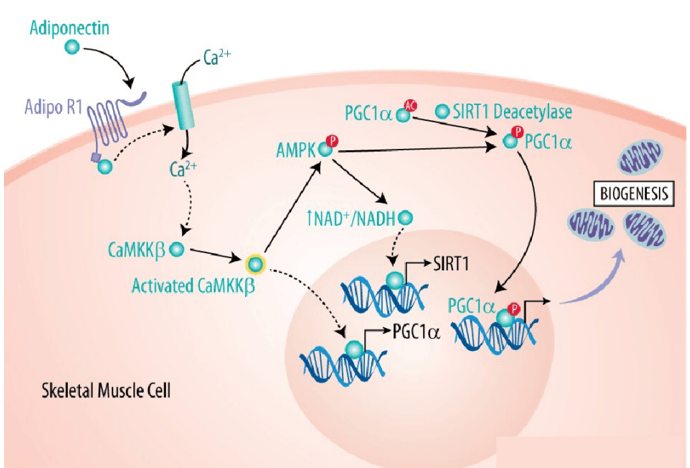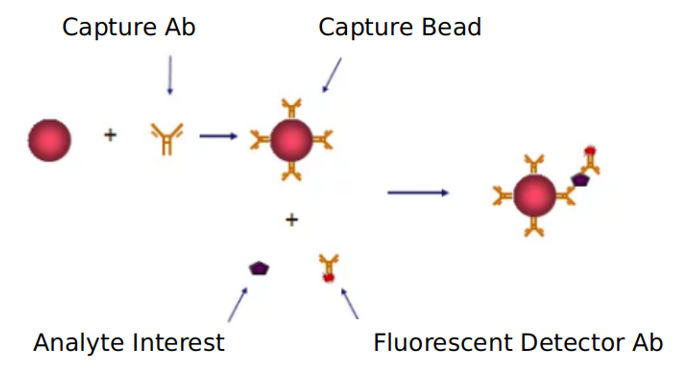Adiponectin signaling pathway
Based on Luminex technology platform, Creative Proteomics provides analysis services for key targets of adiponectin signaling pathway.
 (Deepa S S, et al., 2019)Lipocalin, also known as Acrp30, is an adipocytokine that positively regulates glucose and lipid metabolism by increasing insulin sensitivity, stimulating fatty acid oxidation and glucose uptake, and inhibiting hepatic gluconeogenesis. Lipocalin deficiency is commonly associated with obesity and is highly correlated with insulin resistance, mitochondrial dysfunction and dyslipidemia. 2003 saw the identification of two lipocalin receptors, Adipo R1 and Adipo R2.3, with Adipo R1 being the primary lipocalin receptor expressed in skeletal muscle, which is the primary glucose-utilizing tissue in the body.
(Deepa S S, et al., 2019)Lipocalin, also known as Acrp30, is an adipocytokine that positively regulates glucose and lipid metabolism by increasing insulin sensitivity, stimulating fatty acid oxidation and glucose uptake, and inhibiting hepatic gluconeogenesis. Lipocalin deficiency is commonly associated with obesity and is highly correlated with insulin resistance, mitochondrial dysfunction and dyslipidemia. 2003 saw the identification of two lipocalin receptors, Adipo R1 and Adipo R2.3, with Adipo R1 being the primary lipocalin receptor expressed in skeletal muscle, which is the primary glucose-utilizing tissue in the body.
Lipocalin signaling promotes activation of PGC1 alpha and mitochondrial biogenesis. Lipocalin binding to Adipo R1 leads to calcium inward flow in skeletal muscle, which activates CaMKK β. Activated CaMKK β induces the expression and activation of PGC1 α through a cascade reaction that involves the activation of AMPK and increased production of SIRT1 deacetylase. AMPK phosphorylation and SIRT1 deacetylation of PGC1 α increase its transcriptional activity, leading to increased mitochondrial biogenesis.
Lipocalin, an adipokine secreted by white adipose tissue, plays an important role in regulating glucose and lipid metabolism in insulin-sensitive tissues and in controlling energy homeostasis. APPL1 is the first identified protein that interacts directly with the lipocalin receptor.
Our detectable targets:
| RTK | PI3K | TYK2 | STAT1 | STAT2 | STAT3 |
| PSGL1 | IRS2 | MSK1 | TLR3 | Tak1 | TRIF |
| TNFR | ISGF3 | MSK2 | PI3K | TBK1 | Vav |
| STAT5 | IRAK4 | JNK | MYD88 | Rac1 | TLR4 |
| CD3 | IRF5 | MEK3 | p38MAPK | SH2 | TRAF6 |
| CREB | IRF3 | MAPK | NAP1 | Rel | TLR9 |
| p38 | Fas | ISRE | mTOR | PKR | TRAF5 |
| MHC-II | IRS1 | MEK6 | p50 | SLP76 | TRAM |
| TCR | icam1 | Mda-5 | NFκB | RIG-1 | TRAF3 |
| GAS | IRF9 | MEKK1 | RIP1 |
Technology platform:
We provide Luminex technology for adiponectin signaling pathway analysis.
Luminex technology is a multifunctional liquid phase analysis platform, which is developed on the basis of high-speed digital signal processing technology, colored microspheres, applied fluidics and laser technology. The core is the use of fluorescent dyes for encoding. By adjusting the different ratios of different fluorescent dyes, more than 100 microspheres with different fluorescence spectra were obtained. The reactions are carried out on microspheres with different fluorescent codes, such as nucleic acid hybridization, antigen-antibody, enzyme-substrate, ligand-receptor binding reactions. Using laser detection technology, qualitative and quantitative analysis of microsphere encoding and reporting fluorescence.
Advantages of adiponectin signaling pathway detection:
- High throughput: It can analyze more than 100 target molecules in the same sample at the same time.
- Low sample consumption: Due to the small size of the microspheres, samples as low as 1 puL can be detected, and 100 different target molecules can be detected simultaneously in the same reaction well, which greatly saves the amount of sample.
- The operation is simple and quick: the liquid phase system is adopted, the reaction time is fast, and the detection of various cytokines can be completed within 2-3 hours.

Application of our service:
- Study the impact of each clinical virus on the adiponectin signaling pathway
- Research on the regulatory mechanism of adiponectin signaling pathway in medicine
Creative Proteomics has developed a signaling pathway target detection platform. We can provide detection services not only for adiponectin signaling pathways, but also for other signaling pathways. If you want to detect other targets, please contact us in advance and we will customize the service for you according to your requirements. Looking forward to working with you.
References:
- Deepa S S, Dong L Q. APPL1: role in adiponectin signaling and beyond. American Journal of Physiology Endocrinology and Metabolism, 2019, 296(1).
- Yamaguchi N, Argueta J, et al. Adiponectin inhibits Toll-like receptor family-induced signaling. FEBS Letters, 2020, 579(30): 6821-6826.
- Changhua, Wang, Xuming, et al. Adiponectin Sensitizes Insulin Signaling by Reducing p70 S6 Kinase-mediated Serine Phosphorylation of IRS-1. Journal of Biological Chemistry, 2017, 282(11): 7991-7996.

